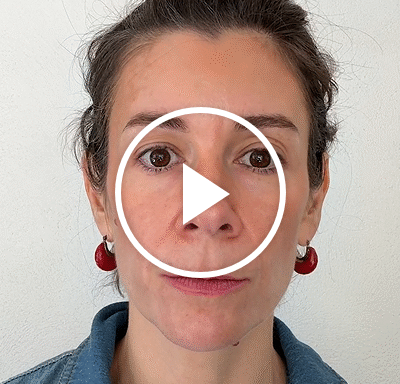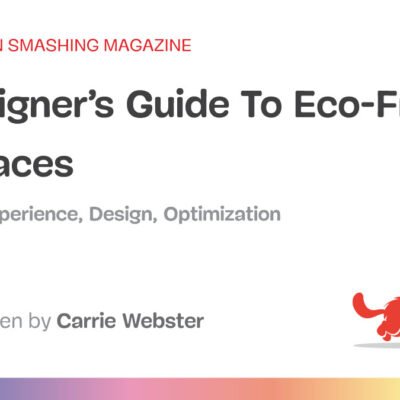Google is starting to roll out an AI-based Q&A feature to Google Business Profiles (GBP) on Google Maps for mobile.
This feature will very likely replace Google Q&A, which has silently gone missing on some listings.
The “Ask Maps about this place” AI feature was first announced in late October 2024, along with a number of other Google Maps AI enhancements, but has not been widely available or visible.
At the time, Google also noted that “you’ll also see similar experiences in the coming months on Search – including AI-powered review summaries and the option to ask detailed questions about places.”
Currently, the feature is available on the Google Maps app, buried on the profile in the Overview tab, beneath the basic business NAP details and the review summaries.
How Does It Work?
Ask Maps allows users to input open-ended questions into a query box. While it offers and suggests pre-formed queries tailored to the business, users can also ask specific questions.
Pre-formed queries can differ significantly by business location (for multi-location businesses), with businesses sharing minimal overlap. And sometimes, similarly formulated questions might deliver slightly different answers.
The query field allows for compound questions. Although, the more you ask, the more likely you will be told that there isn’t enough information about this place to answer your question.
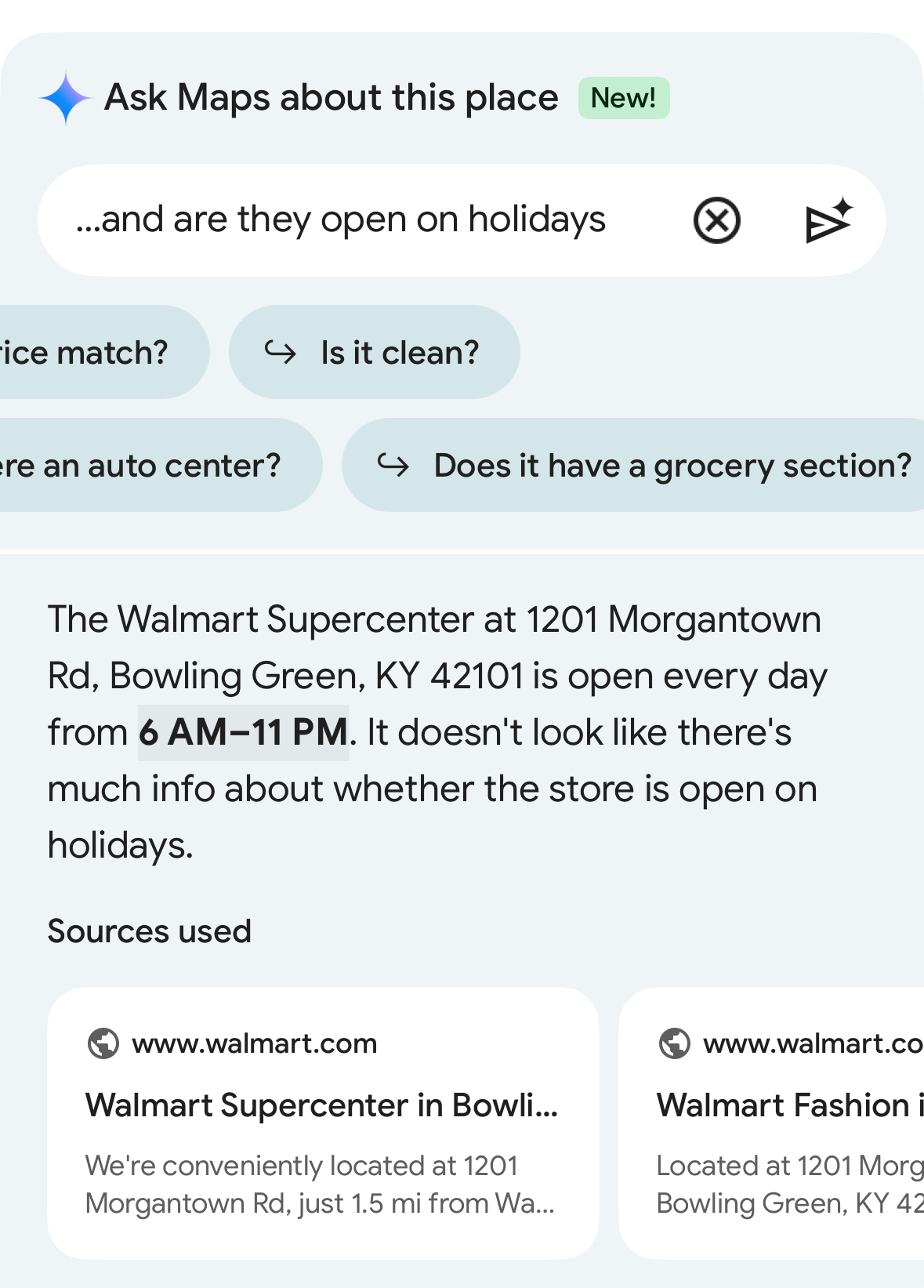 Screenshot from Google Search, January 2025
Screenshot from Google Search, January 2025Ask Maps often, but not always, suggests six pre-formed queries – a kind of local version of People Also Ask – to help the searcher more quickly get their potential questions answered.
Some listings have no questions, and a few have two to four of these suggested queries.
These pre-formed queries vary by location, with even locations tied to the same brand sharing minimal overlap.
In looking at four or five different store locations, there were only a few of these questions that were duplicated.
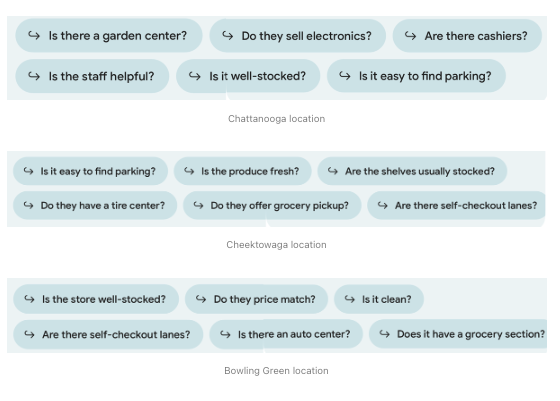 Screenshot from Google Search, January 2025
Screenshot from Google Search, January 2025We were curious about whether the review corpus or previous Q&A answers were used to generate these pre-formed queries.
We downloaded and analyzed reviews and Q&A content using N-grams, word clouds, and ChatGPT. We found virtually no correlation between the existing Google Q&A or review content and the pre-formed queries presented.
Obviously, a searcher can ask any question of the AI.
As mentioned, however, if Google does not have enough data from the listing attributes, reviews, the business website, or trusted third-party sites, the user will be told: “There’s not enough information about this place.”
Not Every Category
Unlike the soon-to-be legacy Q&A feature, Ask Maps excludes some business categories and is only available in U.S.-based locations.
In our review, the feature wasn’t present on profiles for most healthcare providers, counseling, social services, pregnancy care, and drug rehab centers, although we did find it on dentist profiles.
The feature was also not visible on highly distressed and spammy categories like moving companies, locksmiths, and garage door listings. It was available in categories that are less spam-filled, like HVAC, roofers, and electricians.
Profiles of businesses in legally regulated categories like marijuana dispensaries, tobacco, guns, or dating services did not have the feature.
The primary category of the listing determines whether the feature appears or not.
YMCA locations in my area each have slightly different categories, and the one with social services as the primary category did not have Ask Maps, while all the others did.
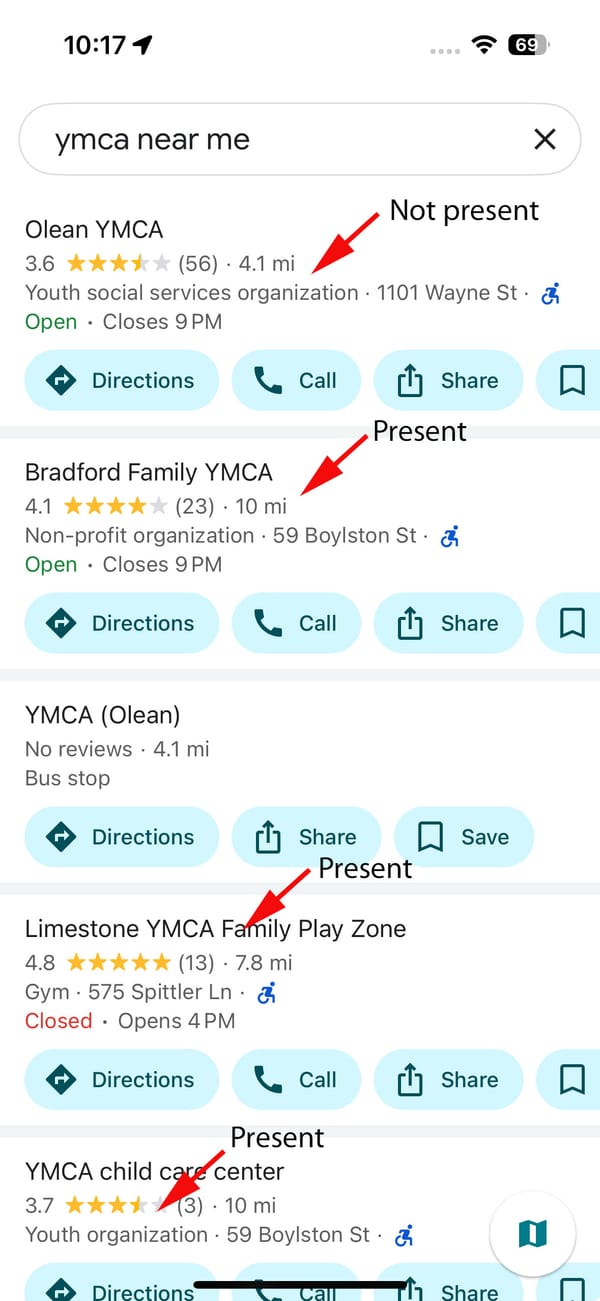 Screenshot from Google Search, January 2025
Screenshot from Google Search, January 2025Where Does The Information Come From?
Google says:
“All of these features are made possible thanks to Gemini’s powerful creation, reasoning and summarization capabilities — grounded in our trusted data about 250 million places around the world and insights from the Maps community.”
In answering Ask Maps questions, Google appears to rely first on content in the business profile, GBP reviews, and the business website before it will access third-party content.
When Google had images from GBP image uploads relevant to the answer, those were included as well.
While the source for these images, in the example we saw, was represented as the business website, the images all came from Google Business Profile.
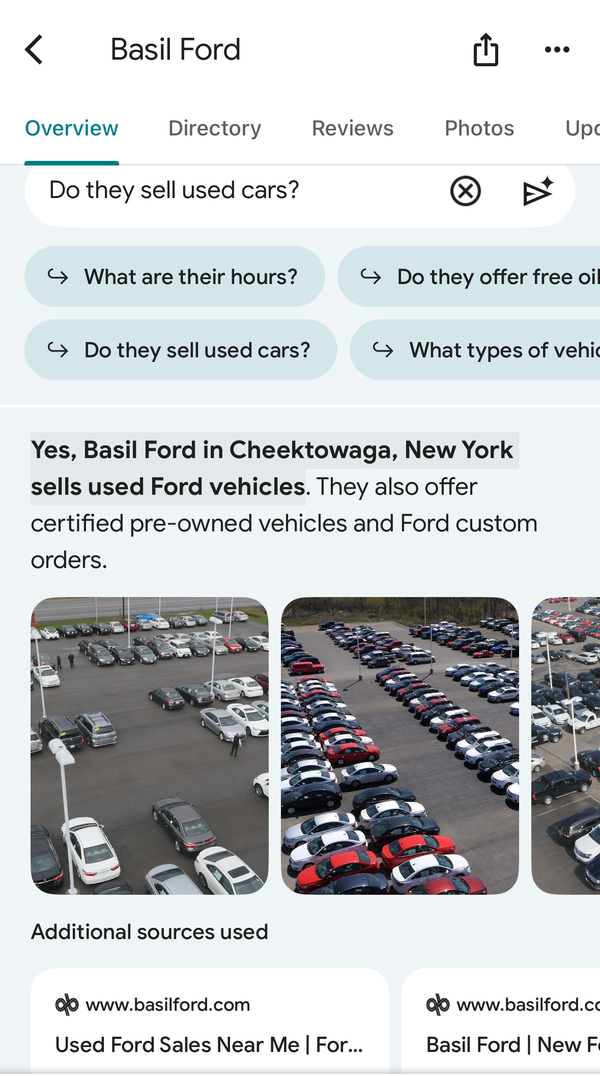 Screenshot from Google Search, January 2025
Screenshot from Google Search, January 2025Ask Maps will go out to third-party web sources if needed to answer a question, and the site is trusted.
In the following example, we asked about issues that customers had experienced with this dealership, and the response referenced Carfax.com and Facebook.
Oddly, Ask Maps is currently unable to answer product inventory questions even when Google clearly has the inventory uploaded to Merchant Center, and it shows elsewhere on the profile.
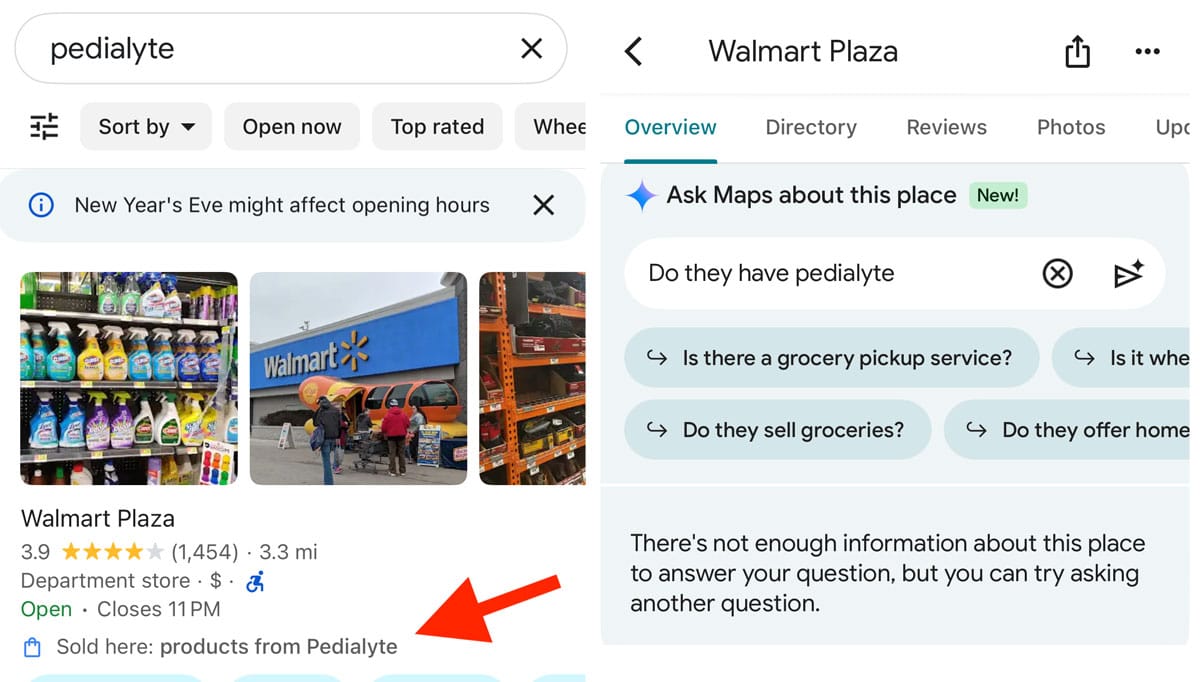 Screenshot from Google Search, January 2025
Screenshot from Google Search, January 2025Reviews From The Web
It’s obvious that consumers value reviews, and Ask Maps gives them access to both summary of the worst and best of Google reviews, as well as reviews from around the web.
The query below, asking about Barbara Oliver Jewelry’s “rating around the internet,” surfaced the review summary (using Local schema) directly from her website with additional data from Facebook.
However, despite numerous attempts, it would not surface her Yelp reviews.
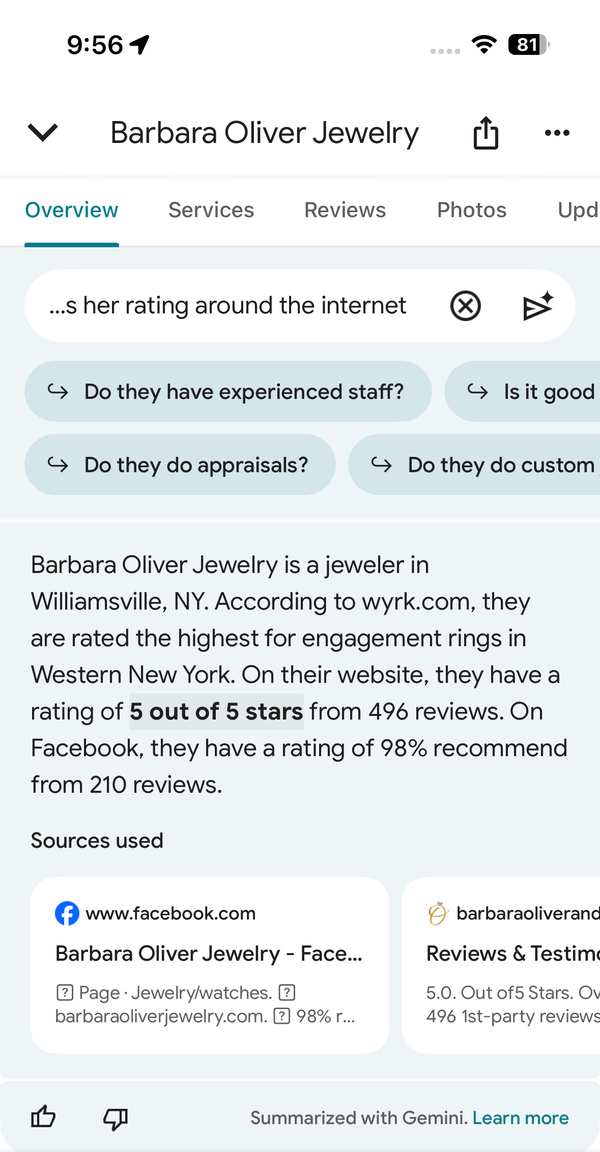 Screenshot from Google Search, January 2025
Screenshot from Google Search, January 2025Your Website As Data Source
The following video demonstrates Ask Maps’ ability, in many situations, to answer questions that previously required a visit to a business website.
On the Barbara Oliver jewelry profile, we asked, “What’s involved in custom ring design?” and got back a 118-word answer that referenced multiple sections and pages from the Barbara Oliver website.
Google Q&A Deprecation
Clearly, this feature is a major improvement upon Google Q&A, which rolled out in early 2018. Most Q&A answers are user-generated and often repetitive, contradictory, or inaccurate.
Initially, the feature was highly visible on the Business Profile in search, although it has moved down the page more recently.
A contributor in the Google support forums was recently told that the current Q&A feature is being deprecated.
As communicated in our previous email, the Q&A feature is no longer available to any of our users, regardless of their location. Additionally, there is no support link or method through which you can verify this information independently. Please note that this update aligns with Google’s new guidelines. As per these changes, profiles that are updated in accordance with the latest requirements will not have a Q & A option available.
This has yet to be formally confirmed by Google. But it makes sense given that Ask Maps, once it rolls out more widely and to search, does a significantly better job of answering questions than Q&A could ever hope to. Ask Maps does so by using a limited number of reliable sources.
At the moment, Ask Maps is U.S. only. In its current form, it probably violates EU DMA regulations and highlights the massive self-preferencing occurring with Google Local.
It’s, therefore, unlikely to come to Europe anytime soon. Although, it is likely to show up elsewhere soon.
Local Marketing Strategy Response
Google continues to move down the path of more dynamic AI-generated content on your Google Business Profile.
While this behavior changes dramatically by vertical, there is every reason not just to treat your profile as your new homepage but to up your game in that regard.
In a practical sense, it doesn’t really matter whether your leads come directly from Google or from your website as long as they are coming in. And when you can gain an edge by feeding Google, you should.
Website
As the example above demonstrates, Google answers user questions with substantial and meaningful responses.
My colleague David Mihm has long argued that your website content is perhaps best viewed as a feed for search and now AI engines.
You need to be sure that your site has a properly siloed structure and content.
The content must answer all important customer questions about your business. This includes not just what you do, but how and where and how well you do it.
It should show as well as tell, by providing imagery and video on top of text.
Reviews
Given the ability of tools like Ask Maps to summarize your reviews from both Google and from around the web, it’s more important than ever to both diversify your review content and highlight them on one of Ask Maps’ most trusted sources: your website.
Photographs
We have long championed original, high-quality photography (and video) on both your website and GBP.
It leads to increased engagement (a ranking signal) and increased conversions (the ultimate goal). And your photos need to be regularly updated at both places for maximum benefit.
There is no more economical way to get higher returns than great photographs and video.
Social Profiles
Google first looks at GBP data, then reviews, and then the business website. But if the question cannot be answered there, it will then start pulling in information from your social accounts.
Facebook and LinkedIn were common in our testing, and you should be sure that they are up-to-date and accurately reflect your products, services, and reputation.
Citations
Google has long relied on web references (a.k.a. citations) – non-linked branded mentions – from around the web to understand local entities.
This can be seen very clearly in the screen below, where we asked if the business owner supported local volunteer organizations.
Both a news article and the Facebook page for one of the organizations she works with were referenced.
This type of sourcing is also a great research tool to understand the types and sources of valuable citations for your business.
These types of searches should be done for your direct competitors as well to provide additional ideas on where you might be able to get these references.
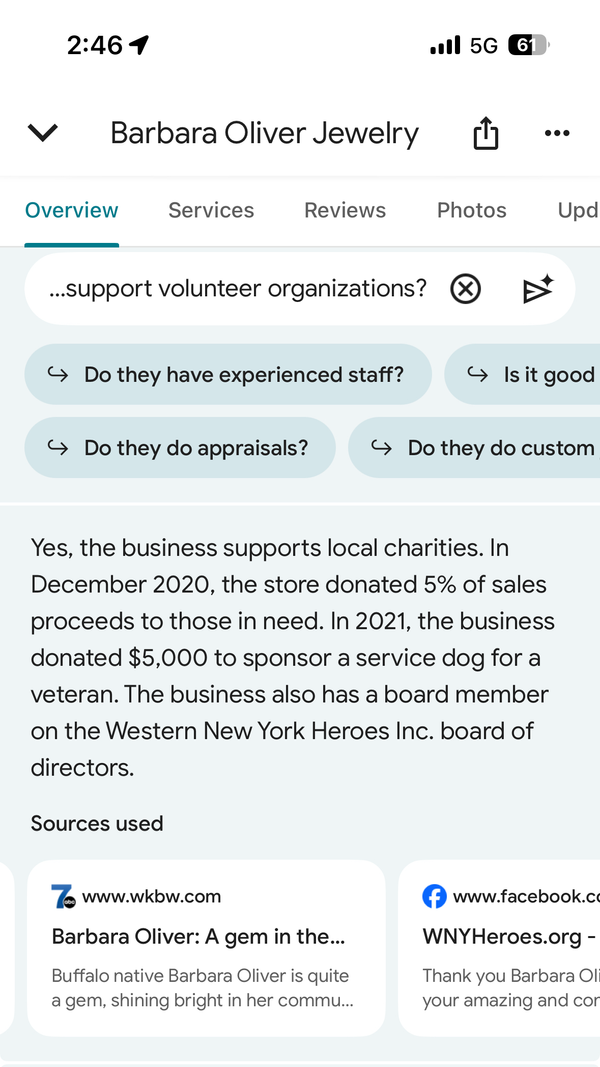 Screenshot from Google Search, January 2025
Screenshot from Google Search, January 2025The Future Of Local
The growing “zero-click” behaviors in Google Local inevitably lead to declining traffic for small business websites. These types of changes will continue unless the government steps in to regulate it as a monopoly.
For some sectors, like publishing, which depends on traffic for ad sales, this is a potential death knell – in local. However, traffic losses can often be replaced with more leads from GBP if you play Google’s game.
As frustrating as it is sometimes, we think that the game is still worth playing. The leads generated can be significant. But the types of content and signals Google needs these days to rank you well (branding, reviews, engagement, etc.), you should be doing regardless.
That game is increasingly verticalized on Google – or at least user behaviors are.
To really excel in this environment, you need to understand consumer behaviors in your specific vertical and tailor everything you do to address and satisfy them.
More Resources:
Featured Image: Darko 1981/Shutterstock


